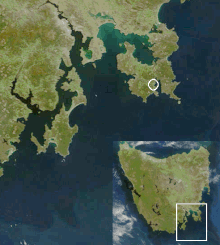Port Arthur massacre (Australia)
| Port Arthur massacre | |
|---|---|

Location of Port Arthur, where the majority of the shootings occurred
|
|
| Location | Port Arthur, Tasmania, Australia |
| Coordinates | 43°8′12″S 147°51′10″E / 43.13667°S 147.85278°ECoordinates: 43°8′12″S 147°51′10″E / 43.13667°S 147.85278°E |
| Date | 28–29 April 1996 11:45 a.m. – c. 8:00 a.m. (UTC+10) |
| Target | Port Arthur Historic Site |
|
Attack type
|
Shooting spree, carjacking, arson, mass murder |
| Weapons | |
| Deaths | 35 |
|
Non-fatal injuries
|
24 (including the perpetrator) |
| Perpetrator | Martin Bryant |
The Port Arthur massacre of 28–29 April 1996 was a massacre in which 35 people were killed and 23 wounded. It occurred mainly at the historic Port Arthur former prison colony, a popular tourist site in south-eastern Tasmania, Australia. It was the deadliest mass shooting in Australian history, and amongst the worst in the world.
Martin Bryant, a 28-year-old from New Town, a suburb of Hobart, was found guilty of the shootings and given 35 life sentences without possibility of parole. Following the incident, it emerged in the media that Bryant had significant intellectual disabilities. He is now imprisoned in the Wilfred Lopes Centre near the Risdon Prison Complex.
Following the spree, the Prime Minister of Australia, John Howard, introduced strict gun control laws within Australia and formulated the National Firearms Programme Implementation Act 1996, restricting the private ownership of high capacity semi-automatic rifles, semi-automatic shotguns and pump-action shotguns as well as introducing uniform firearms licensing. It was implemented with bipartisan support by the Commonwealth, states and territories.
Martin Bryant inherited about $570,000 AUD (£300,000 GBP or $450,000 USD) worth of property and other assets from a friend, Helen Harvey, who left her estate to him. He used part of this money to go on many trips around the world from 1993 onwards. Bryant also withdrew many thousands of dollars during this period. He used at least some of this money in late 1993 to purchase an AR-10 semi-automatic rifle through a newspaper advertisement in Tasmania. In March 1996, he had his AR-10 repaired at a gun shop and made enquiries about AR-15 rifles in other gun shops. In April 1995, he also purchased cleaning kits for a .30 calibre weapon and a 12 gauge Daewoo shotgun. He purchased a sports bag and told a shop attendant that it would need to be strong enough to carry large amounts of ammunition. He told his girlfriend, Petra Wilmott, a different story about the purpose of the bag. He also hid the weapons and a large amount of ammunition at his house. At the time of purchase no registration of guns outside of handguns was required in Tasmania.
...
Wikipedia
